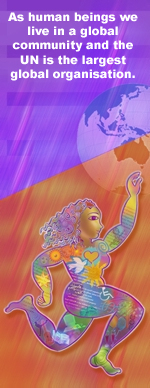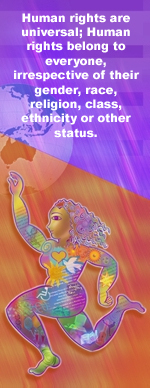Woman of the World - What is the United Nations?
Woman of the World -
Know Your International Human Rights
- Preface
- What are human rights?
- What is the United Nations?
- The UN: Protecting the rights of woman
- What is CEDAW
- Australia's signing of CEDAW
- A guide to the rights in CEDAW
- CEDAW and the Sex Discrimination Act
- The Optional Protocol to CEDAW
- What about Beijing?
- What can you do: The public sphere
- What can you do: Private actions
The United Nations (UN) is an international organisation of 188 member countries (called sovereign states or states parties). The UN was formed after the tragedy of the Second World War to promote international peace, achieve international cooperation for international problems and advance human rights. The UN, together with its programmes, funds and specialised agencies, makes up the UN system.
 The goals and the role of the UN are set out in the UN Charter. See: http://www.un.org/aboutun/charter/index.html
The goals and the role of the UN are set out in the UN Charter. See: http://www.un.org/aboutun/charter/index.html
Why do we need a United Nations?
As human beings we live in a global community and the UN is the largest global organisation. The UN has the commitment of governments throughout the world and is ideally placed to deal with some of the major issues facing people of our world.
The UN and its agencies provide a forum for the development and enforcement of international human rights standards.
- Members to the UN appoint diplomatic representatives to interact with representatives from other nations at UN headquarters and agencies. When there is conflict in the world, or urgent issues requiring discussion, these representatives are able to deal with the issue quickly and with international support.
- The UN and its agencies help to share information, build economies and provide assistance for development, or to deal with crises. The aim is to eradicate disease, expand food production and increase stability around the world.
- The UN and its agencies protect vulnerable groups of human beings including women, children, refugees, displaced persons, minorities, Indigenous people and people with disabilities.
Who participates in the United Nations?
Only governments of independent countries, or sovereign states, can be members of the UN. However, non-government organisations (NGOs) have come to play an important role in the functioning of the UN. NGOs provide information, lobby and negotiate. For example, Amnesty International and the International Campaign to Ban Landmines are two NGOs that have had a valuable impact on the advancement of human rights at the international level through the UN. Both of these organisations are non-profit, voluntary groups made up of ordinary citizens from around the world.
Some 1,520 NGOs have a special UN status know as "consultative status" with the Economic and Social Council at the UN. This allows these NGOs to attend UN conferences, address specific meetings and interact with country representatives. In poorer countries, NGOs work together with the UN to help people in need.
What is an International Human Rights Convention?
An international human rights Convention is a collection of human rights standards that has been put into the form of an agreement between different countries of the world. To be bound by the Convention, a national government must sign the Convention. This makes it 'a party' to the Convention. A national government can then ratify the Convention, which then binds the government to the Convention's terms.
Governments agree to ensure that the people living within their boundaries are able to access and enforce the rights within the Convention. A government then becomes subject to the scrutiny of the United Nations, including by special committees set up under the Convention, other governments, and NGOs, for its actions in implementing human rights.
 In Australia, signing a Convention does not automatically make the human rights it contains part of our domestic law. Further steps must be taken to give the Convention legal force in Australia.
In Australia, signing a Convention does not automatically make the human rights it contains part of our domestic law. Further steps must be taken to give the Convention legal force in Australia.
Our federal government is responsible for signing Conventions and participating in the UN processes. Australian state and territory governments do not participate directly in these processes. However, they are often responsible for giving effect to the human rights contained in Conventions.
Enforcing human rights:
Governments can use many strategies to implement an international human rights Convention. A number of strategies are important, as merely creating new laws is not an effective way to change social practices and attitudes, often responsible for human rights violations. Strategies utilised by our federal government over the years have included:
- creating laws that make human rights violations illegal under Australian law;
- adopting policies and programs to ensure that people have access to their human rights (this might include training members of the police to understand the effect of violence on women and the appointment of special police officers, including women police officers, to deal with instances of violence against women);
- ensuring that human rights are properly enforced, including providing resources and assistance, access to courts and appropriate punishment for violations; and
- providing education and awareness raising programs about human rights.

